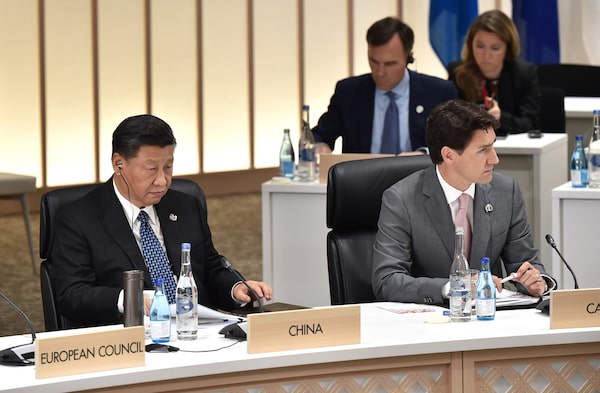
China's President Xi Jinping (L) and Prime Minister Justin Trudeau (R) attend session 3 on women's workforce participation, future of work, and aging societies at the G20 Summit on June 29, 2019 in Osaka, Japan.KAZUHIRO NOGI/Getty Images
Casey Babb is the author of the forthcoming book, Digital Fortress: Strategies of Authoritarian Survival in Cyberspace, an international fellow with the Glazer Israel-China Policy Center at the Institute for National Security Studies (INSS) in Tel Aviv, and an associate fellow at the Royal United Services Institute in London, England.
More often than not, when China is involved in a confrontation – whether it be a military, economic or political row – it is assumed that Beijing has the upper hand, or that the country is in a more advantageous position than its foe.
Indeed, given the expectation that China will surpass the United States as the world’s largest economy in the not-too-distant future, the fact that it boasts the world’s largest military, and its history of rather successfully leveraging global dependencies on crucial goods to navigate disputes, it makes sense why China’s ability to out-escalate and prevail in adversarial situations is presented as a sort of fait accompli. However, this thinking is flawed and it certainly does not apply to Beijing’s continuing row with Canada.
By now, most are aware that Canada has entered into yet another spat with China. Following reports in The Globe and Mail of Beijing’s pervasive foreign-interference efforts in Canada, including threatening activity targeting Conservative member of Parliament Michael Chong and his Hong Kong-based relatives, Ottawa declared Chinese diplomat Zhao Wei persona non grata on May 8, giving him until May 13 to leave the country. The following day, on May 9, China retaliated by expelling a Canadian envoy in Shanghai, in what China’s Foreign Ministry has described as a “reciprocal countermeasure.”
For many, this diplomatic quarrel has led to fears that China could escalate the situation, or even disproportionately respond with a range of economic measures – something it has done to Canadian exporters in the past. Yet concerns that Beijing will take this rift to another level fail to take into account a variety of factors that will likely contain and restrict China’s willingness to further coerce Canada into accepting its behaviour.
MPs unanimously vote to probe Chinese envoy’s alleged targeting of Michael Chong
To start, while Canada is economically dependent on China, bilateral trade relations between the two countries are a two-way street. Sure, China might not need us as much as we need them, but as an export-focused economy, the roughly $100-billion worth of goods Canada imported from China in 2022 is not inconsequential – especially for a country whose economy has dramatically slowed. In fact, last year China experienced its worst year for gross domestic product growth in nearly half a century.
In addition, a range of domestic pressures and uncertainties are putting a strain on Xi Jinping and the Chinese Communist Party (CCP), making it harder for Beijing to navigate these types of spats. As many have noted, the regime is facing a loss of public confidence. Issues such as the country’s draconian zero-COVID measures that decimated China’s economy and exposed the regime’s inherent weaknesses, record-level debt, declining productivity growth, high youth unemployment rates, ailing property markets, and a range of restrictive government policies tethered to Mr. Xi’s strategy to rein in what he has described as a “disorderly expansion of capital,” raise doubts about Beijing’s interest in and ability to strong-arm its way out of conflicts.
Another priority issue for Mr. Xi is addressing the country’s strained relations and isolation from Western powers, something that has worsened in recent years. China has stated publicly that it wants to “recalibrate” its relations with the United States and its allies – something it knows it must do if the country stands any real chance of capitalizing on a potential post-COVID boom. A deterioration in relations with Canada would fly in the face of that and could potentially lead to a ripple effect with some of Ottawa’s closest allies, a scenario Mr. Xi and the CCP want to avoid at all costs.
All told, China is weaker than you think – and Canada may very well be able to push back harder than expected without the fear of economic or additional diplomatic consequences. As this episode in Canada-China relations evolves and takes shape, expect Beijing to take a more cautious and measured approach. While China’s typical hard-line rhetoric will likely persist, there is no doubt Beijing wants this story to disappear sooner rather than later.
Canada’s export community should breathe a sigh of relief and remember: China needs us, too.
Opinion: The diplomatic expulsions could provide a welcome reset of Canada’s relationship with China